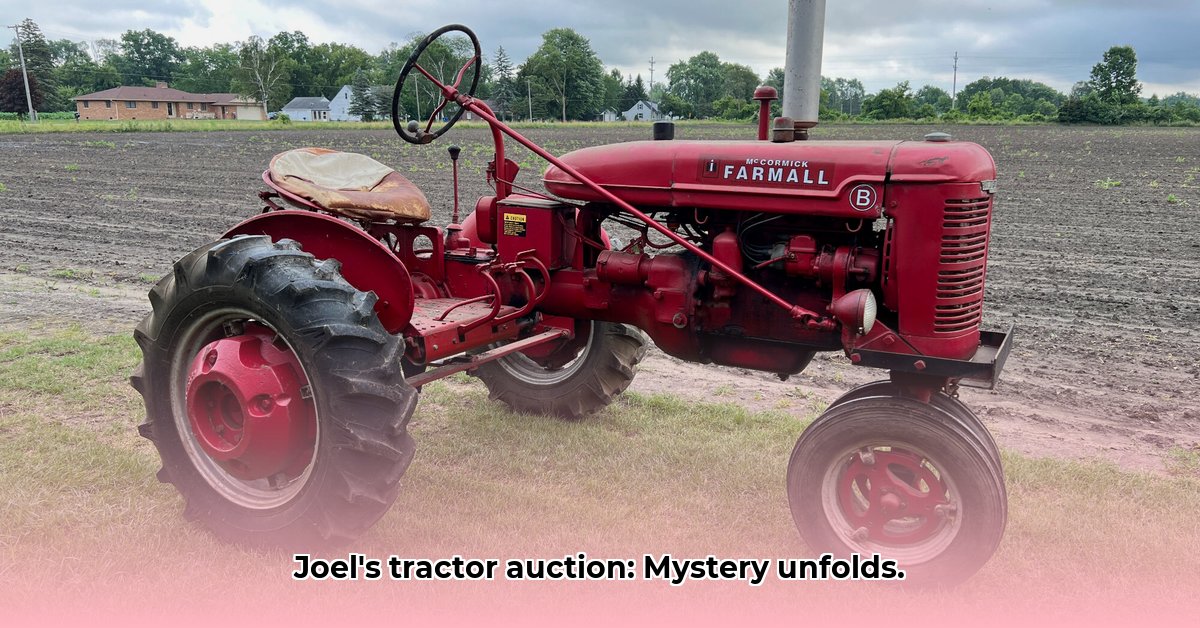
Joel's Tractor and Auction: A Sudden Silence
The sustainable agriculture community recently experienced an unexpected disruption. Joel’s Tractor and Auction, a long-standing and reputable source of used, sustainable farming equipment, has abruptly ceased operations. This unexpected development has left farmers, equipment dealers, and the broader sustainable agriculture sector searching for answers. The silence surrounding the closure is raising concerns about access to affordable and environmentally friendly farming tools.
The Mystery of the Missing Auctions
For years, Joel’s Tractor and Auction served as a cornerstone of the rural community, facilitating the buying and selling of used tractors, harvesters, and other essential equipment. These auctions were more than simple transactions; they fostered community, bringing farmers together and promoting sustainable practices by making cost-effective equipment accessible. The sudden cessation of these auctions, without explanation or prior notice, has created uncertainty and raised questions. Attempts to contact Joel's Tractor and Auction for comment have been unsuccessful, adding to the mystery surrounding this event.
Unraveling the Enigma: Potential Causes
The lack of official communication leaves room for speculation. Possible explanations range from temporary setbacks due to unforeseen circumstances to permanent closure due to financial challenges or shifts in market dynamics. Another possibility involves an internal restructuring or a strategic shift in business operations. The absence of concrete information necessitates further investigation to determine the true cause of the auction's cessation. Understanding the underlying reasons is crucial for assessing the long-term implications for the sustainable agriculture sector.
Ripple Effects Across the Industry: Market Impact Analysis
The disappearance of Joel's Tractor and Auction has created significant ripple effects throughout the agricultural ecosystem. The immediate consequences are felt most acutely by farmers, particularly those reliant on used equipment for cost-effective, environmentally conscious farming.
Short-Term Impacts: Farmers may face reduced access to affordable equipment, leading to higher prices for new machinery and potential difficulties in finding specific parts or models. This impact could disproportionately affect smaller, sustainable farms whose operational budgets are often more constrained.
Long-Term Impacts: The situation could lead to increased reliance on new equipment purchases, escalating operational costs and possibly causing consolidation within the farming sector. Furthermore, the reduced supply of used equipment could impact equipment manufacturers, altering the demand for both new and used goods. The sustainable farming sector as a whole might experience supply chain disruptions and increased pressure to adapt, potentially leading to innovation in sustainable equipment production.
Here's a simplified view of potential impacts:
| Stakeholder Group | Short-Term Impacts | Long-Term Impacts |
|---|---|---|
| Farmers | Reduced access to affordable used equipment; higher equipment prices | Increased reliance on new equipment, higher operating costs; potential farm consolidation |
| Equipment Dealers | Decreased used equipment sales; need for new inventory sources | Business model adaptation, increased online sales; focus on maintenance/repair services |
| Sustainable Farming | Reduced availability of sustainable equipment; supply chain disruptions | Increased pressure for adaptation; potential acceleration of sustainable equipment innovation |
Finding Sustainable Used Farm Equipment Alternatives: A Proactive Approach
The sudden absence of Joel's Tractor auctions underscores the need for farmers to find alternative solutions for obtaining sustainable used farm equipment. Several strategies can be employed:
- Online Marketplaces: Explore online agricultural equipment sales platforms, carefully vetting sellers and equipment condition.
- Local Dealers and Auctions: Investigate local agricultural equipment dealers and auction houses that may offer similar sustainable equipment.
- Networking: Connect with fellow farmers for leads on used equipment or alternative sources.
- Government Programs: Research government programs and subsidies that support sustainable agricultural equipment purchases.
- Equipment Leasing: Consider leasing equipment as an alternative to outright purchase.
Careful planning is essential. Farmers should assess their specific equipment needs, budget constraints, and the condition of any potential equipment before making a decision. Thorough due diligence can mitigate the risks associated with higher prices, limited availability, and potential equipment reliability issues.
The Uncertain Future: What Lies Ahead?
The long-term consequences of Joel's Tractor and Auction's closure remain uncertain. Further data, including past auction records and analysis of competing auction houses, is needed to better understand the situation. The agricultural community awaits clarity, anticipating potential changes in the market and adapting strategies accordingly. The closure could signal a significant shift in the agricultural equipment landscape; or, equally, Joel's Tractor and Auction may eventually resume operations with an evolved business model. Only time will tell which scenario unfolds.